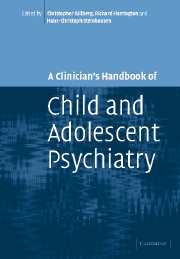Book contents
- Frontmatter
- Contents
- Preface
- List of contributors
- 1 Brain disorders
- 2 Substance use disorders
- 3 Schizophrenia and schizophrenia-like disorders
- 4 Affective disorders
- 5 Anxiety disorders
- 6 Obsessive-compulsive disorders
- 7 Adjustment disorders
- 8 Post-traumatic stress disorder
- 9 Functional somatic symptoms and somatoform disorders in children
- 10 Eating disorders: anorexia nervosa and bulimia nervosa
- 11 Sleep disorders
- 12 Personality disorders
- 13 Mental retardation/learning disability
- 14 Specific developmental disorders of speech and language
- 15 Reading and other learning disorders
- 16 Autism spectrum disorders
- 17 Hyperkinetic disorders
- 18 Conduct disorders
- 19 Elective mutism
- 20 Attachment and disorders of attachment
- 21 Tic disorders
- 22 Elimination disorders: enuresis and encopresis
- 23 Physical and sexual abuse
- 24 Gender identity disorders
- Index
- References
8 - Post-traumatic stress disorder
Published online by Cambridge University Press: 06 August 2009
- Frontmatter
- Contents
- Preface
- List of contributors
- 1 Brain disorders
- 2 Substance use disorders
- 3 Schizophrenia and schizophrenia-like disorders
- 4 Affective disorders
- 5 Anxiety disorders
- 6 Obsessive-compulsive disorders
- 7 Adjustment disorders
- 8 Post-traumatic stress disorder
- 9 Functional somatic symptoms and somatoform disorders in children
- 10 Eating disorders: anorexia nervosa and bulimia nervosa
- 11 Sleep disorders
- 12 Personality disorders
- 13 Mental retardation/learning disability
- 14 Specific developmental disorders of speech and language
- 15 Reading and other learning disorders
- 16 Autism spectrum disorders
- 17 Hyperkinetic disorders
- 18 Conduct disorders
- 19 Elective mutism
- 20 Attachment and disorders of attachment
- 21 Tic disorders
- 22 Elimination disorders: enuresis and encopresis
- 23 Physical and sexual abuse
- 24 Gender identity disorders
- Index
- References
Summary
Introduction
It has only been in the last 20 years that researchers have systematically investigated the psychological effects of trauma on children. Early studies of children's reactions to traumatic events did not use a consistent format to report symptoms and relied upon general assessments of global behaviours typically completed by parents or teachers. Adults tend to underestimate the severity of the psychological effects experienced by their children with global measure of behaviour being insensitive to the specific changes in cognitions or emotions associated with traumatic reactions. Interviews undertaken with children using assessments sensitive to the core features of post-traumatic stress disorder (PTSD), namely trauma re-experiencing, avoidance and arousal, reveal that children are significantly affected by traumatic events.
Since the mid-1980s considerable knowledge about PTSD in children exposed to single and multiple traumas has accrued. Children have been found to experience PTSD following a range of traumatic events including natural disasters such as flooding, fires, lightening strikes, hurricanes, landslides and earthquakes. PTSD following a range of human-made traumas such as wars, kidnapping, bombings, sniper attacks, abuse and hostage taking has also been documented as well as following transportation accidents such as shipping disasters and coach accidents. Finally post-traumatic stress disorder arising from more common everyday traumatic events such as road traffic accidents, acute physical injury and chronic illness has also been reported.
Definition and classification
PTSD is defined as an anxiety disorder associated with a traumatic event in which the trauma is repetitively re-experienced.
- Type
- Chapter
- Information
- A Clinician's Handbook of Child and Adolescent Psychiatry , pp. 221 - 245Publisher: Cambridge University PressPrint publication year: 2006
References
- 1
- Cited by



